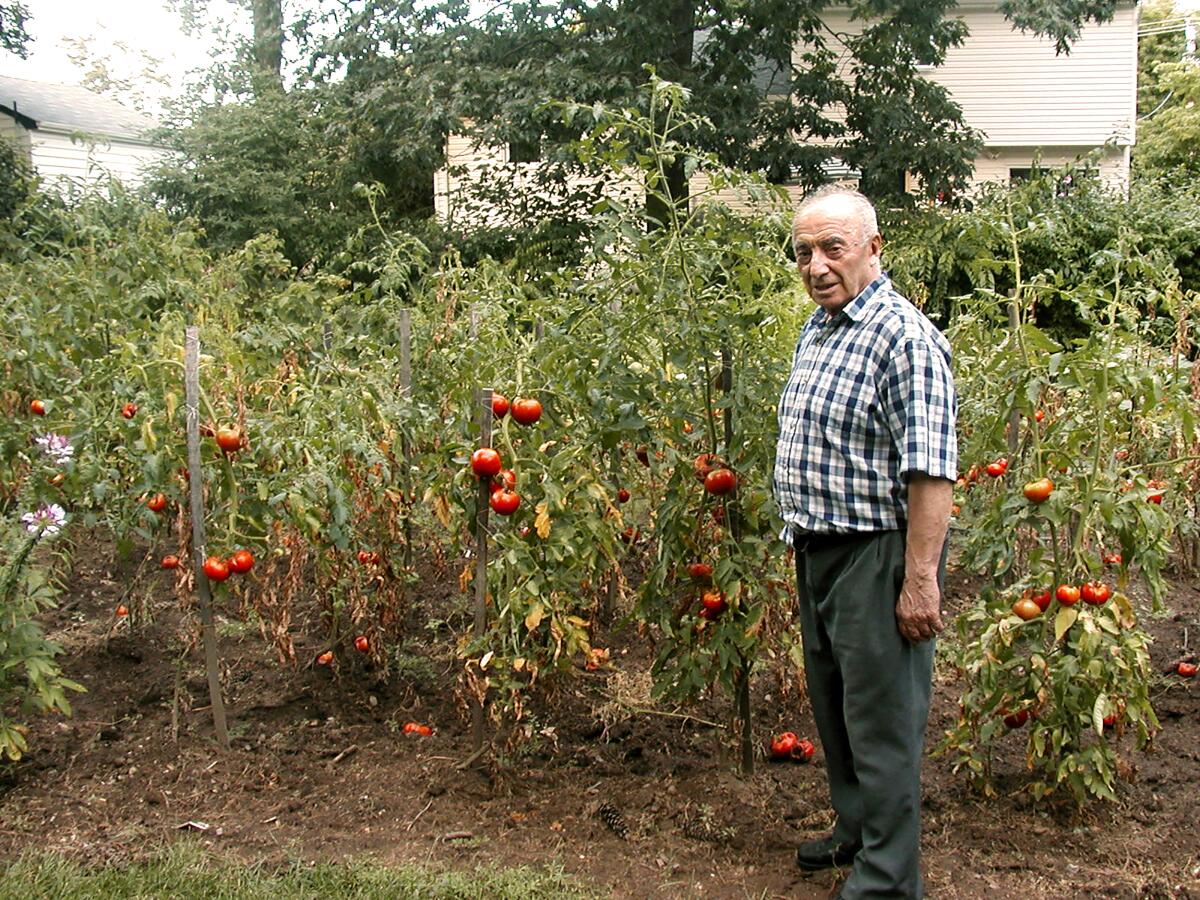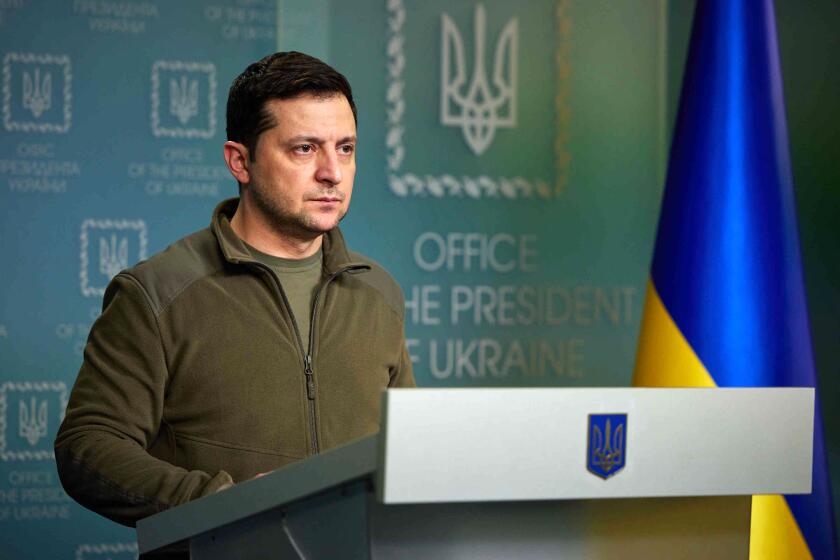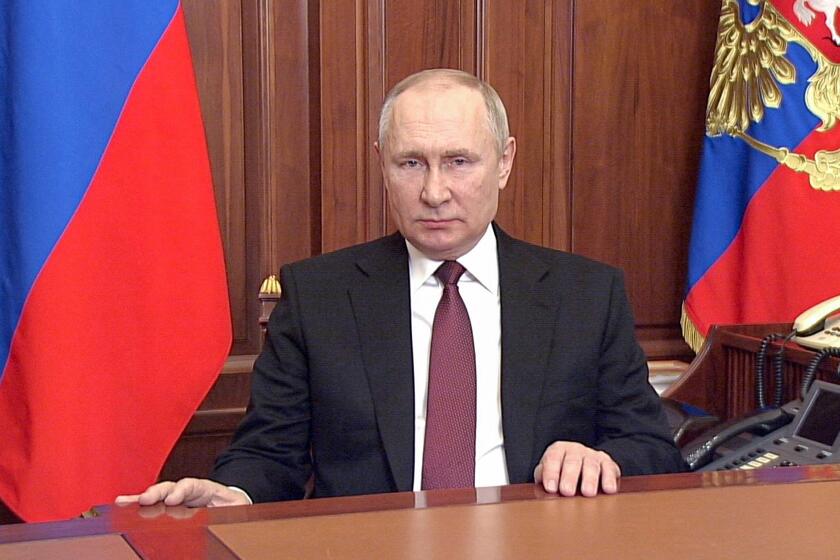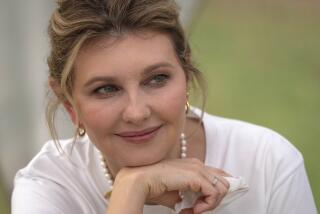Before his death, my grandfather returned to the language of Ukraine

- Share via
At the end of his life, before he died of COVID-19 in 2020, my grandfather decided he would speak only Ukrainian.
My maternal grandparents immigrated to New York in 1987 from Zhmerynka, a city in southeastern Ukraine, five hours from Kyiv. My parents and I had come to the U.S. six years prior, but they were holding onto the promise of the Soviet Union as home, despite the many ways that nation told my Jewish, World War II-veteran grandfather that he didn’t matter.
After surviving the wartime Jewish ghetto, he was conscripted at 17 into the Soviet army, where he served through the end of the war, joining in victory celebrations after the Battle of Berlin. Later, as an agronomist, he was sentenced by the Soviet government to a year of labor for growing vegetables such as beets instead of the state-sanctioned corn. Even after the Chernobyl disaster, my grandparents stayed in the Soviet Union until they were given official permission to join us. At the airport, Soviet officials stripped him of his war medals.
When they arrived in the United States, my grandfather was suspicious of America’s ease, its squishy bread, its industrial food complex. He started his own garden in my parents’ backyard in New Jersey, growing garlic, sorrel and beefsteak tomatoes. He fished for bass in the Oradell Reservoir of the Hackensack River. His rhapsodies on the nutritional benefits of protein were legendary in our family.
Ukraine’s comedian-turned-president has acted admirably, even heroically, rallying the nation and demonstrating that he has no intention of fleeing.
He thought religion was a fiction, but — just in case — God should probably not be ruled out entirely. He spoke about watching his neighbors get shot in the ghetto as a 17-year-old boy and whispered to me that he’d managed to save a cyanide pill from his time in the army and wouldn’t hesitate to use it in case things got bad again. As an artillerist in the army, he found mementoes of slain Soviet soldiers to send home to their families.
The older he got, the more my grandfather emphasized his ghetto and war stories, hoping that I would write about them someday. But it was hard to listen to tales of genocide at joyous family get-togethers. Sometimes I couldn’t help but tune him out.
As he got older and began showing signs of dementia, my grandfather no longer spoke about the cyanide pill, although he did scare us in other ways: assaulting the bus driver who drove him to his senior care center, marching to the train station in the middle of the night and threatening to jump in front of a train. When, for his overnight safety, the door to his apartment was secured, he climbed out of his kitchen window.
It may be that Russia will still manage to win some sort of military victory in Ukraine. But even if it does, the future does not look good for Putin.
Because my Ukrainian-born mother had married my Moscow-born father and we had lived in Moscow, and because Russian was a required language in Ukrainian schools, our family spoke to one another exclusively in Russian. But Yiddish was the only language my grandfather trusted. His only true home was soil, the birthplace of human sustenance.
Then suddenly, three years ago, when in his mid-90s, my grandfather started responding to us solely in Ukrainian. We had no idea what happened. Was it due to spending his days with a Ukrainian healthcare aide? Was he displaying spiritual fealty to the bittersweet land of his difficult life?
Had he survived COVID, he would be watching the invasion footage on television and weeping, seeing yet another war in his lifetime, one half of his family attacking the other. He might have told me, in Ukrainian, that it was finally time to find the cyanide pill. But I wouldn’t have understood him, if I ever did.
Irina Reyn is the author of three novels, including “Mother Country,” which is set during the 2014 Ukraine conflict.
More to Read
A cure for the common opinion
Get thought-provoking perspectives with our weekly newsletter.
You may occasionally receive promotional content from the Los Angeles Times.











